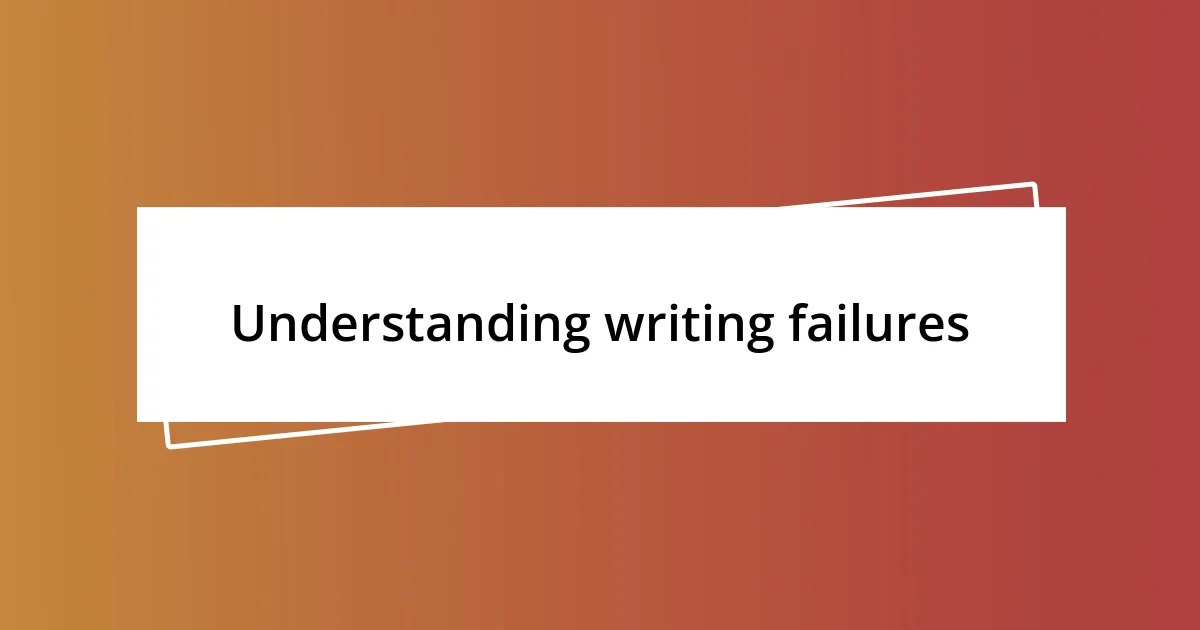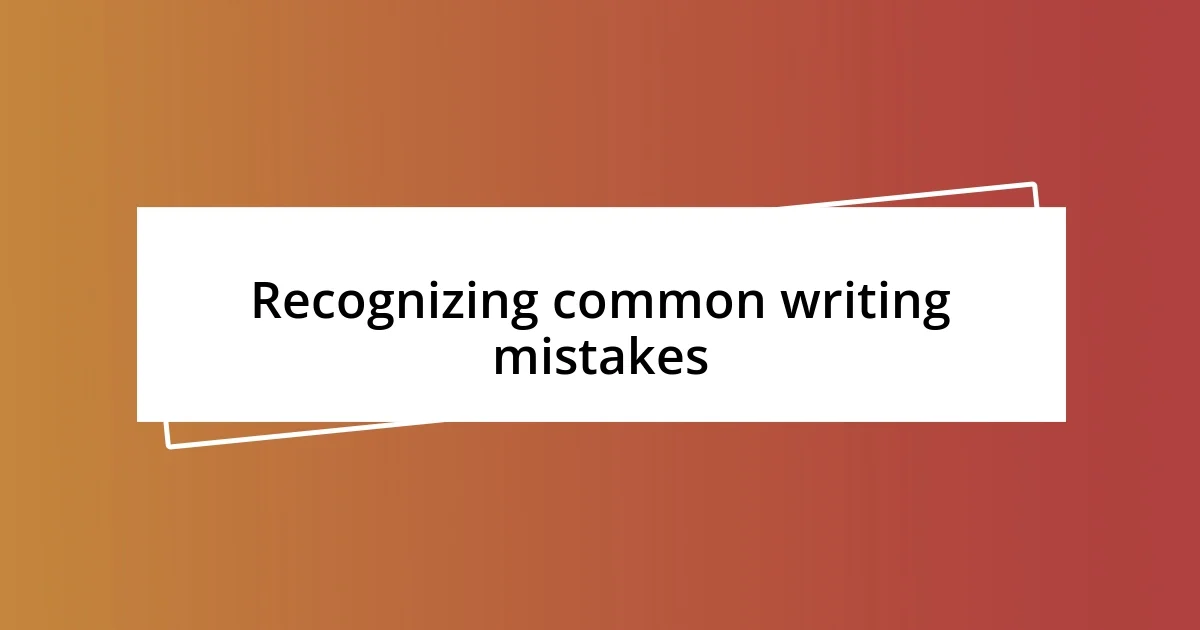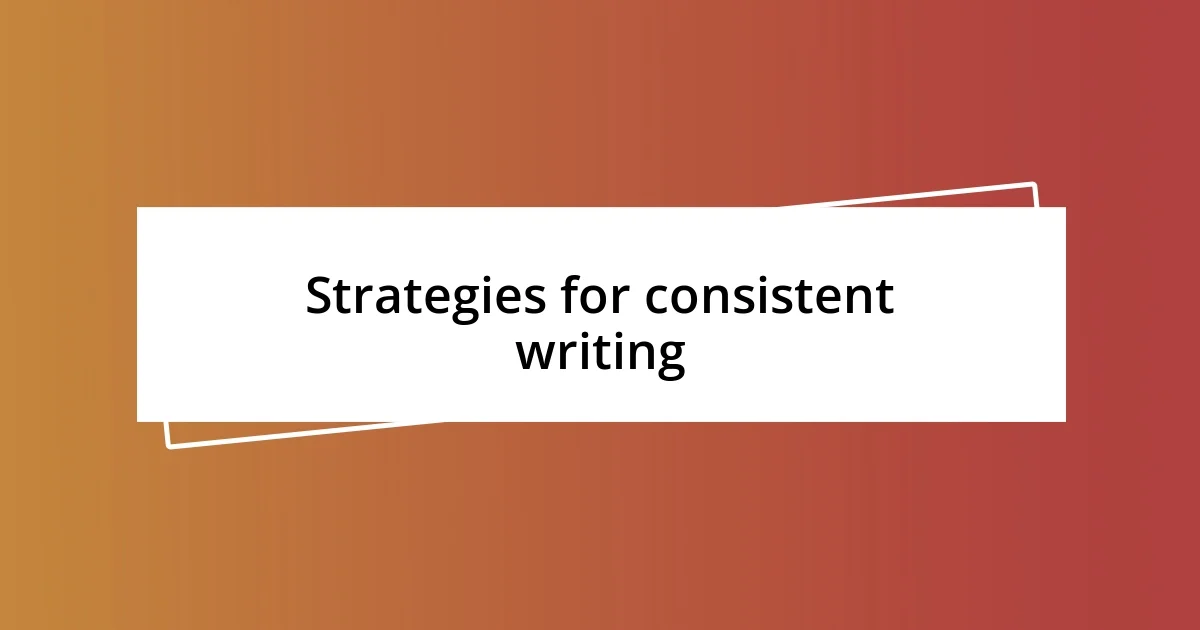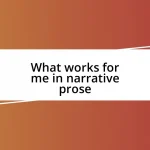Key takeaways:
- Writing failures are valuable lessons that encourage self-reflection and growth, emphasizing the importance of understanding the reader’s perspective.
- Common writing mistakes, such as overly complex sentences and neglecting audience needs, can hinder clarity and engagement, highlighting the need for structured writing.
- Establishing realistic writing goals, daily routines, and seeking accountability through a supportive community are crucial strategies for consistent writing and personal development.

Understanding writing failures
Writing failures can be challenging to confront, but I’ve learned that they often carry the most significant lessons. I remember a time when I poured my heart into an essay, only to receive a critique that left me feeling deflated. It stung, but it also pushed me to reflect on why my writing didn’t resonate. Have you ever considered how failure can be the starting point for unexpected growth?
Often, it’s not just about the words on the page; it’s about the emotions behind them. I’ve had pieces that felt strong and powerful to me, yet the feedback suggested otherwise. It made me realize that our personal connection to the work doesn’t always translate to the reader. Why is it that sometimes our best intentions can fall flat? This is where self-awareness becomes crucial.
In my journey as a writer, I’ve come to see failures as stepping stones rather than roadblocks. Each setback revealed blind spots in my writing process—things I didn’t even know I needed to work on. It’s almost like peeling an onion; every layer removed uncovers something deeper. Isn’t it fascinating how each misstep has the potential to refine our craft?

Recognizing common writing mistakes
Recognizing common writing mistakes is essential for growth. There have been times when I thought my grammar was flawless, only to discover tiny errors that clouded my message. I remember submitting a short story filled with vivid imagery, yet it fell short due to inconsistent tense usage. That experience taught me how critical clarity is; even a small mistake can pull readers out of the narrative and break their immersion.
Here are some common pitfalls to look out for:
- Overly complex sentences: My urge to showcase my vocabulary sometimes leads to convoluted phrasing that confuses readers.
- Lack of structure: There have been instances when my ideas flowed haphazardly, making it difficult for readers to follow my train of thought.
- Neglecting the audience: I’ve mistakenly written for myself instead of considering what my readers need or expect.
- Passive voice usage: I often found that passive constructions made my writing feel less engaging—active voice usually packs a stronger punch.
- Ignoring feedback: At times, I’ve been resistant to criticism, but I learned that embracing it can lead to tremendously valuable insights.

Analyzing my personal setbacks
Analyzing my setbacks has been eye-opening. One instance that stands out is when I received feedback on a novel draft. I had envisioned a twist that I thought was genius. However, to my dismay, many readers didn’t connect with it at all. It was a bitter pill to swallow, but it forced me to rethink how I conveyed my ideas and consider how much the reader’s perspective mattered. Have you ever felt so attached to an idea, only to find out it didn’t land as you hoped?
Another notable setback occurred during a poetry workshop. I submitted a piece that felt deeply personal, yet the reactions were lukewarm at best. I felt exposed and disheartened. It made me realize that raw emotion doesn’t always translate effectively on the page. My writing lacked the universal touch that draws readers in. This process prompted me to ask myself: how can I create relatable content that resonates with others? The insights from that experience were invaluable.
Lastly, I’ve learned that my setbacks often reveal deeper patterns in my writing habits. For instance, I noticed a recurring issue with pacing in my stories. I would spend too long on scenes that didn’t move the plot forward and rush through pivotal moments. By analyzing this trend, I was able to adjust my approach, ensuring each part of my writing served a purpose. Recognizing these patterns has truly enhanced my writing clarity and structure.
| Setback | Lesson Learned |
|---|---|
| Novel Draft Feedback | Importance of reader perception in conveying ideas. |
| Poetry Workshop Reactions | Need for crafting universal themes to resonate with readers. |
| Pacing Issues | Each scene must serve a specific purpose to enhance the narrative. |

Practical solutions to improve writing
Working on my writing has introduced me to several practical solutions that truly enhance my craft. One approach that changed my perspective was creating an outline before diving in. It initially felt restrictive, but I learned that a clear roadmap keeps my ideas organized. Have you ever started writing only to realize halfway through that your thoughts were all over the place? Outlining significantly reduces that chaotic feeling and ensures I stay focused.
Another strategy I’ve adopted is setting aside time for free writing. This method allows my creativity to flow without the pressure of perfection. In my early attempts, I’d freeze up with the fear of making mistakes. Now, I understand that letting thoughts tumble onto the page can often lead to unexpected gems. It’s like a brainstorming session with myself, where the only rule is to write freely. What if every first draft was a chance to explore unfiltered ideas? That’s a game-changer for me.
Lastly, I prioritize reviewing my work with fresh eyes. After completing a piece, I take a break before revisiting it. This separation works wonders; I often spot errors and clarity issues I missed before. Each review session feels like a mini-adventure, uncovering new layers of my writing. Have you tried stepping away from your work? It’s incredible how a little distance can provide fresh perspectives, revealing what truly connects with readers.

Setting realistic writing goals
Setting realistic writing goals has been a game-changer for me. Early on, I often aimed for the impossible, like finishing a novel in a month while managing my day job. Imagine the stress! I quickly learned that dividing large projects into smaller tasks made them feel more achievable. For instance, instead of saying, “I’ll write a full chapter today,” I’d focus on just writing a thousand words. It felt manageable, and taking those small steps kept my motivation high.
A memorable moment was when I decided to set a daily goal of just 300 words. At first, it felt almost too easy, but I was surprised at how quickly they added up. Some days, I’d get in the flow and surpass it, while on others, I felt accomplished just reaching that number. This taught me the importance of flexibility; some days are more productive than others, but that doesn’t mean I’m failing. Have you ever noticed how allowing yourself to start small can lead to bigger accomplishments over time?
I also started scheduling dedicated writing time in my calendar. Treating these appointments as important as any work meeting shifted my mindset. One afternoon, when I blocked off an hour to write, I felt free from distractions. I immersed myself in my draft, and those sixty minutes turned into an exhilarating flow state. How often do we underestimate the power of carving out time for our passions? Embracing realistic goals and structured time has not only heightened my productivity but has also made writing feel like a rewarding journey rather than a daunting task.

Strategies for consistent writing
Every writer needs dependable strategies for consistent writing. One method I found remarkably effective is establishing a daily writing ritual. At first, I thought, “How can a mere routine help my creativity?” But, when I committed to writing at the same time each day, it transformed my approach. I began to associate those moments with creativity—like flipping a switch that activated my thoughts. Have you ever noticed how consistency breeds inspiration? I truly believe it can.
Another strategy is utilizing writing prompts. There was a time when I felt completely lost for ideas, almost like staring into an empty abyss. I discovered that writing prompts helped spark my imagination; they acted as tiny catalysts, redirecting my thoughts in unexpected directions. What if a single sentence could open the floodgates to a whole new world of expression? In my experience, those simple prompts saved me from countless moments of writer’s block.
Additionally, I learned the importance of accountability. Joining a writers’ group did wonders for my motivation. The first time I shared my work, I felt a mix of nerves and excitement. But having people who understood my struggles pushed me to show up regularly. It’s fascinating how a little pressure from a supportive community can transform our writing habits. How about you—do you have someone to share your writing journey with? That shared experience has been vital for my growth and consistency as a writer.

Reflections on growth through failure
Sometimes, I’ve found that failure is the best teacher. There was a time when I submitted a piece I thought was polished, only to receive feedback that it felt rushed and disorganized. That sting of disappointment was intense, but it also ignited a fire in me to improve my writing process. I started to embrace the idea that every misstep was a stepping stone toward better clarity and expression. Reflecting on that moment helped me realize that growth often arises from discomfort. Have you had a similar experience where a setback revealed deeper insights about your craft?
I recall a specific instance after a particularly tough writing workshop. The critiques were so honest that I felt like my voice had been stripped away. Feeling vulnerable, I took some time to really think about what they said. It dawned on me that while constructive criticism can hurt, it’s a pivotal part of personal development. I began to see every critical comment as an opportunity to refine my style. What about you? How do you handle feedback that feels less than kind? Shifting my perspective turned those painful moments into growth opportunities, ultimately enriching my writing.
Reflecting on these experiences, I’ve learned that failure doesn’t just happen; it’s often a necessary part of the creative journey. One evening, as I sat in front of my laptop, I recalled all those drafts that never made it to publication. Instead of feeling defeated, I found strength in the realization that each of those ‘failures’ was a chapter in my growth story. They taught me resilience and shaped my voice. Isn’t it interesting how our struggles can lead to profound understanding? Embracing this cycle of failure and growth is what keeps me moving forward as a writer.












